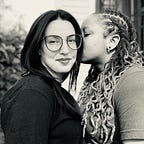Euphoria for an Addict’s Daughter Pt. I
How Zendaya, Colman Domingo, and Sam Levinson made me call my father.
cw: addition
My cousin, a brilliant singer and aspiring drag icon, refuses to sing “Ave Maria” at weddings, knowing, as he does, what the latin lyrics are: a cry to the blessed mother “at the hour of our death,” a final plea to a higher power.
It’s also the final song of “Trouble Don’t Last Always,” the hour long episode of the not-a-new-season season of “Euphoria.” This is as far as you can read without mild spoilers, so go in on a subscription with a fellow queer, watch it, and come back (thanks in advance for the extra read towards my count).
My family are no strangers to addiction, neuro-divergence, or complicated fathers. I am the queer daughter of a bi-polar addict and formerly incarcerated person. I am also an educator and writer self-studying abolition. I was once a “daddy’s girl.” Now, I don’t speak to my father at all aside from ping-pong text exchanges on holidays and (most) birthdays.
The cognitive dissonance of this has been ringing louder and louder in my ears.
On a Monday in June he texted me
“Miss you….”
and the ellipsis made me roll my eyes.
The next text came almost a month later on the Monday after my pandemic wedding — a seven person sacrament in the seventh ward of New Orleans where we read an Assata Shakur poem as vows and smoked a joint rolled with gold papers in celebration afterwards.
“Congratulations!!!! Hope to see you two together sometime!!!”
I didn’t reply.
I had been grateful that the pandemic gave me an excuse to keep my wedding separate from my family. I have always struggled watching “daddy daughter dances” and never needed anyone to walk me down an aisle.
On my birthday he texted me, “Doodle Bug,” happy birthday and told me he loves me. I sent back, “thank you!!”
a concession.
Not long after Rue returns, high and lying, to the table in the diner that is the setting of the majority of the episode, Ali, Rue’s sponsor and subconscious surrogate father, asks her what she believes has more power than her. First facetious and then earnest, Rue lists: a mac truck, the ocean, Otis Redding’s music. Ali dismisses these abstracts and and patiently presses Rue, a child caught in a web of influences stronger than her, to “go deeper” until her self talk crumbles and she’s left with her values laid bare in contrast to her actions — she’s faced, yet again, with the decision of how to move forward.
I love abolitionist theory and think it’s invaluable as a guiding light in struggles against oppression, but sometimes only art can help you work through something. Despite Poppo Ali’s Otis Redding comment, it is the art of which his character is a part that finally cut the lock on my cognitive dissonance.
We don’t know if she’ll stay clean and that’s not the point. The point is that you have to believe in something with more power than you and, at least for the two addicts on screen and the addict’s daughter in front of it, that something is possibility.
If you’re reading this, it means that I texted him and he responded.
